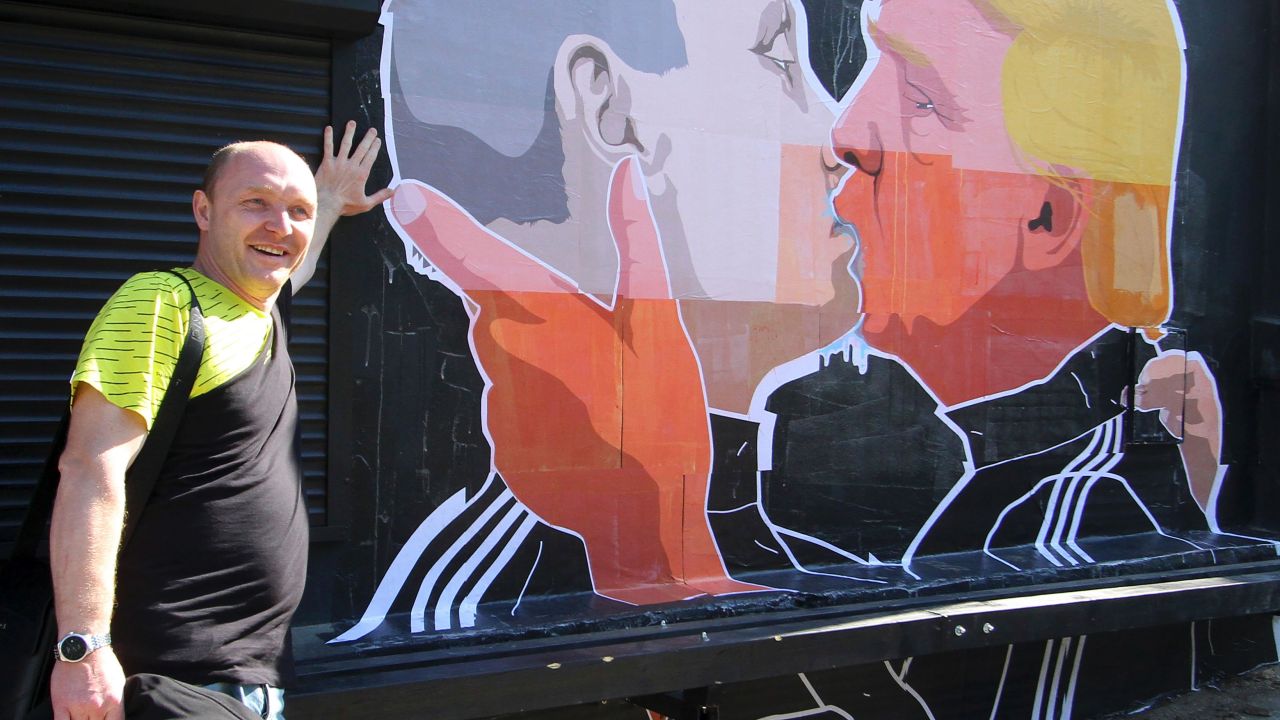
Citizens of other countries are worried about presidential candidate Donald Trump's friendly rhetoric toward Vladimir Putin. Kestutis Girnius, associate professor of the Institute of International Relations and Political Science in Vilnius said this graffiti mural, being shown off by a cafe owner in the Lithuanian capital city, expresses the fear of some locals that Trump is likely to kowtow to the Russian president. (Photo: Petras Malukas/AFP/Getty Images)
“Treason doth never prosper: what’s the reason? Why, if it prosper, none dare call it treason.”
– Sir John Harington (1561-1612)
There has been a break-in at the Democratic National Committee. Documents were stolen with the apparent intention of manipulating the results of a presidential election.
Did this happen in 1972, at the Watergate complex, or in 2016, at 430 South Capitol Street Southeast? Was the break-in a physical burglary, or was it a digital theft? Were the apparent perpetrators naturalized Cubans, or were they Russians in the service of the SVR? To paraphrase Mark Twain, history never repeats itself exactly, but there are occasions when it rhymes.
The crucial difference between 1972 and 2016 is that in the former instance, there was no collusion between an American politician and a foreign state. In the present case, even if there is not (yet) any incontrovertible evidence of collusion, there is a serendipitous congruence of economic interests between Donald Trump and a foreign power, as well as the striking coincidence of his campaign manager, his top European foreign policy adviser and others associated with the candidate’s campaign having economic or career ties with Russia.
The idea that a major-party candidate would conspire with a foreign power to influence a US election is an implausible hypothesis that the mainstream media may have difficulty reporting on, and not merely because of bias or caution, but because the public may not fully absorb it. As Marshall McLuhan observed, “Only the small secrets need to be protected. The large ones are kept secret by public incredulity.” Or, unfortunately, indifference.
One secret that has been hiding in plain sight for almost 50 years also involves Richard Nixon, the author of the Watergate affair, but this time with the participation of a foreign government. The occasion was a closely fought 1968 election that hinged on the candidates’ stance on the Vietnam War, and on the progress of the Paris peace talks.
The incumbent president, Lyndon Johnson, never did succeed in obtaining an agreement with the North Vietnamese on a bombing halt before the election, an achievement that would have favored the Democratic candidate, Hubert Humphrey. Instead, Nixon, claiming a “secret plan to end the war,” narrowly defeated Humphrey and proceeded to continue pointless military involvement for his entire first term.
There have long been rumors that the Nixon campaign colluded with Anna Chennault, a stalwart of the old China lobby, to open a back channel between Nixon’s campaign and the South Vietnamese government. Since that government already took a very hard line against North Vietnam (any peace agreement with the North would likely undercut the Saigon government’s legitimacy), it would be more than willing to block agreement on a bombing halt. In the event, there was no agreement, and Nixon won a narrow victory.
Now, thanks to a remarkable book by Ken Hughes, we know that the rumor is actually incontestable fact. The author produces archival evidence from the Johnson presidential library, intercepts from the FBI and NSA and the Johnson tapes themselves to demonstrate not only that Nixon was conspiring with a foreign power to undermine US diplomacy (an act of treason on its face) but that Johnson knew it and concealed it — which is why most Americans don’t know it.
Why didn’t Johnson blow the whistle, when he himself knew it was treason? One reason was the old chestnut of “sources and methods,” meaning protecting the secrecy of the FBI and NSA intercepts. Another was the argument (which the proverbial man from Mars would find amazing) that the American people’s naïve faith in their institutions and politicians had to be protected at all costs, even in the face of illegality and treason. The foremost advocate of this outrageous thesis was Johnson’s defense secretary, Clark Clifford, a slippery Deep State operative who later came to grief himself over shady dealings with foreign entities.
But I suspect the foremost reason was Johnson himself. By that point, the strain of dealing with the Vietnam War had fatally warped his judgment. He became so obsessed with defending his (futile) Vietnam policy that he was willing to give Nixon (himself a hawk) a pass. By contrast, he had bullied his vice president, Humphrey, for so long that he had lost all respect for him. When Humphrey showed signs of deviating from the party line on Vietnam, Johnson took actions which, as Hughes shows us, objectively favored Nixon, and one may infer that Johnson secretly wanted Nixon to win. Hughes does not explicitly say that, but it is readily deduced from the tone of the transcripts that the author reproduces.
Nixon got away with treason and rigging an election. That makes the idiotic risks he took in Watergate far more understandable in retrospect. After all, he got away with it before.
Fast forwarding 48 years, the evidence is more tenuous. We know that Donald Trump has had extensive connections going back decades with Russia and Russia’s oligarchs. From forensic evidence, the hack of the DNC appears to have been undertaken by elements of Russian intelligence. This allegation should not be surprising, because that’s what foreign intelligence services do — toward the end of my tenure on Capitol Hill, we were frequently warned about foreign governments engaging in phishing expeditions to hack our email accounts.
It may be that Trump’s and the Russian government’s financial interests are simply aligned by happenstance, with no overt collusion. Trump’s financial ties would likely make him instinctively sympathetic to the Russian government’s claims. Russia, for its part, would definitely like to see a US president elected who would reverse economic sanctions against the Kremlin.
The Republicans’ 2016 campaign platform, however, is suggestive of something a little more intense. As a former political operative myself, I know that written platforms are largely a headache to candidates, who would prefer not to have them. But they are a bit more than symbolic nuisances: once written, they can become bludgeons in the hands of the opposing party, which will quote any infelicitously chosen plank loud and long during the general election campaign. Accordingly, the candidates’ campaign personnel normally expend effort to make sure platforms are inoffensive mush.
But not this time. Party activists, mainly from the religious right wing of the party that is not the core of the Trump movement, confected a 2016 platform whose social policy elements were so retrograde that they might have been crafted in 1690s Salem, or present-day Islamabad. Trump, the cosmopolitan libertine, did not care and did not lift a finger to change any of it, despite the fact that it will be a gift to the Clinton campaign in the two parties’ competition for independent voters.
With one exception.
With respect to foreign policy, Trump’s operatives pushed back hard against the GOP’s tradition of an implacably militant stance in one particular: they forced the platform committee to drop any reference to arming Ukraine against Russia. Is it possible that a foreign entity did not understand the labyrinthine intricacies of American politics, and the fact that platforms are mainly campaign symbolism? Did somebody demand a guarantee in writing?
This could also explain why Trump has not released his tax returns — something that every major-party candidate has done ever since Nixon gave the public a reason to demand such information. The common belief about Trump’s refusal is that he is not as rich as he brags he is, that he is extremely stingy with charities or that he pays little or no personal income taxes. But would his returns also reveal business connections with Russian financial interests?
The ironies abound. Through the National Endowment for Democracy and the US Agency for International Development, the United States has meddled often enough in foreign elections. Are foreign governments with an axe to grind now turning the tables on us? We should take heed of our own behavior, even as we condemn presumed foreign interference in our own affairs.
It is also obvious that the US government cannot, even in its wildest dreams, pursue its Captain Ahab-like quest to fight a war on terror throughout the Middle East, South Asia and North Africa without maintaining tolerable relations with major powers like Russia. To fight the so-called “War on Terror” while ginning up Cold War 2.0 is irrational and dangerous, even if lucrative for the merchants of death who infest the Beltway policy process.
The sad irony is that the champion of a renewed détente should be Trump. It is said that a blind hog finds an occasional acorn, and so it is in this case. Nevertheless, we can declare that it should be the goal of US diplomacy to improve relations with virtually every country on the planet — but that does not mean our leaders should come with financial strings attached to them that lead to a foreign capital.
The final irony is this: Why are the most annoyingly ostentatious patriots always the first ones to name their price? Nixon was the first president to wear an enameled flag pin on his lapel — Nixon, who committed treason with a foreign government, compiled an enemies list and went on to subvert the Constitution. Now we have a candidate who says “America first,” denounces whole groups of people for not being American enough and has suggestive financial connections with a foreign power.
Yesterday, Trump held a press conference in which he expressed a wish that Russia or China would “find” Hillary Clinton’s missing emails from when she was secretary of state. His statement crosses the line from legitimate criticism of government policy to encouraging foreign powers — meaning foreign espionage services — to commit cybercrimes and spy against Americans. We shall see in the coming days how Trump’s phalanx of Real Americans digests and rationalizes his outburst of subversion and quislingism.
History may not repeat itself, but the melody is close enough that we should be on our guard.




